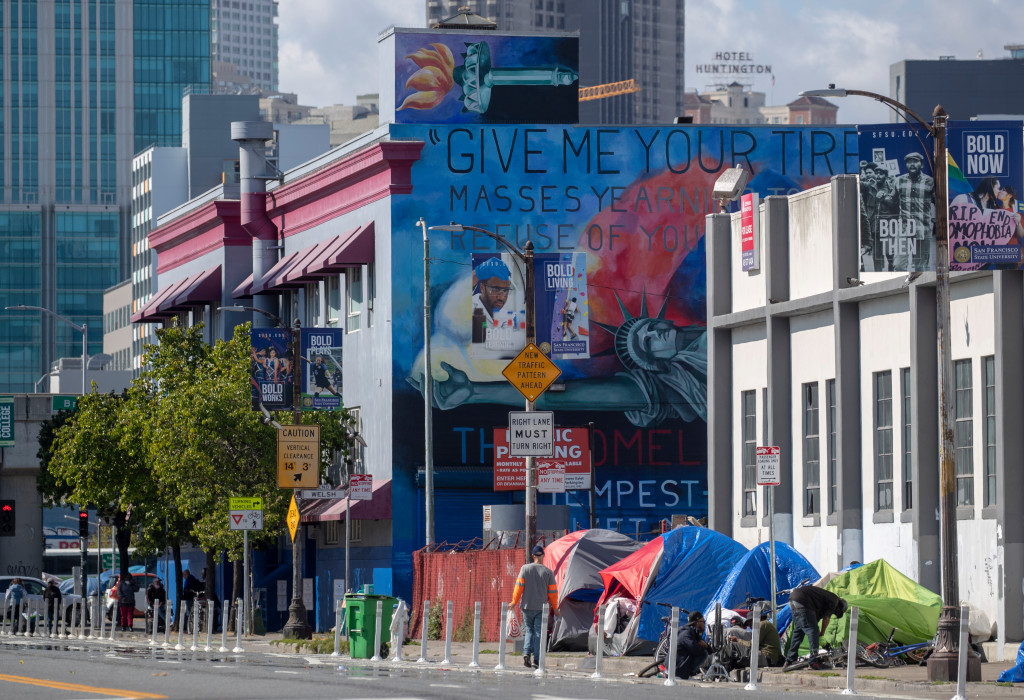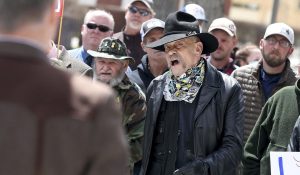As homeless shelters around the Bay Area grapple with how to prevent future coronavirus outbreaks, a San Francisco supervisor is calling on his city to test every person living and working in a shelter, SRO or supportive housing facility.
San Francisco Supervisor Matt Haney on Monday announced a resolution he hopes will urge the Department of Public Health and Department of Homelessness and Supportive Housing to provide free, on-site testing to all residents and staff. So far, San Francisco and other Bay Area cities have used a more piecemeal approach — testing people who show symptoms or have come into contact with another infected person. But, after more than 100 residents tested positive at San Francisco’s largest shelter, Haney said the city isn’t doing enough.
“Thousand of workers every day continue to go into work and serve some of the most vulnerable people in San Francisco,” he said during an online media briefing. “And thousands of San Franciscans continue to live in crowded shelters and congregate living sites like SROs. All of them lack something that should be easily available, which is testing.”
The Board of Supervisors will hear public comments and vote on the resolution on the 29th. Haney also is asking for hazard pay for shelter workers, who he said are on the front lines of the coronavirus crisis.
As of Monday, the outbreak at the MSC-South shelter in San Francisco’s SOMA neighborhood had grown to 106 people, including 10 staff members. Homeless service providers worry there will be more outbreaks at shelters, where physical distancing is difficult to enforce, and in encampments, which are often crowded and unsanitary. They argue not enough testing has been done among this population, in which people are more likely to be older and have underlying health concerns — and therefore at a greater risk of becoming seriously ill if infected. But testing shortages, backlogs in returning results and a resulting under-reporting of positive COVID-19 cases is a problem communities across the U.S. are struggling with — not just the Bay Area’s homeless.
“This population is extremely fragile and this could be devastating,” Dr. Jason Reinking, medical director of the LifeLong Trust Clinic in Oakland, said of a potential outbreak in an encampment or shelter. “Furthermore, right now the general public needs to be invested in fighting against any reservoir of COVID disease in any sort of sub-population within our communities. And this is a prime opportunity for a reservoir of infection that we want to eliminate so it doesn’t spill over into the general population.”
Oakland has yet to report an outbreak at one of its shelters, and Alameda County has reported fewer than 10 confirmed COVID-19 cases among its homeless population, as well as another 12 positive cases where the subject had no known address and might be homeless. As of Thursday, medical workers had tested 53 people living in Oakland’s two largest shelters — St. Vincent de Paul of Alameda County in West Oakland and Crossroads in East Oakland. All tests came back negative.
Drive-thru testing is available for people with symptoms — both housed and unhoused — at fire stations in Hayward and Fremont. And the city of Oakland has opened two drive-through testing sites for first-responders and other essential workers. But activists who work with the homeless and other under-served groups say that’s not enough.
“What about West Oakland? What about North Oakland? What about East Oakland? And what about people who have difficultly with transportation? We’re trying to make available to those clients,” said Dr. H. Geoffrey Watson of the James A. Watson Wellness Center in Oakland.
His clinic, which serves low-income and homeless patients, started offering coronavirus tests last week. So far the clinic has tested six people — all of whom are negative. Watson is hoping to partner with the city to open a drive-through testing site in his parking lot.
A handful of other community clinics also are supplementing testing efforts. The LifeLong Trust Health Center, on 14th and Franklin streets, has set up a tent where homeless residents can be tested after they are screened for symptoms at the clinic. Roots Community Health Center also is offering testing.
In addition to the massive MSC-South outbreak, smaller COVID clusters have been popping up among the homeless and the people who work with them throughout the Bay Area. In San Francisco’s Mission district, two residents have tested positive so far at Casa Quezada — a 52-unit permanent supportive housing site for the homeless, where residents have individual rooms but share kitchens and bathrooms. The city’s Department of Public Health is testing all residents and staff, but Laura Valdéz, executive director of Dolores Street Community Services, which runs the housing site, said she has been pleading with the city to test everyone at Casa Quezada since April 13, when the first positive case was reported. It took until Thursday, and an additional positive test, before officials agreed, she said.
Now Valdéz worries that slow response could have allowed the virus to spread throughout the building. So far two staff members of Dolores Street Community Services, which runs two shelters in addition to Casa Quezada, also have tested positive for the virus, she said.
At HomeFirst, which operates shelters throughout Santa Clara County that serve hundreds of people, four staff members have tested positive for coronavirus. All have since recovered and returned to work, said CEO Andrea Urton.
At least 35 homeless residents have tested positive for coronavirus in Santa Clara County — three of whom had been living at shelters, according to a county representative. All have been housed in hotel rooms or other facilities where they can self-isolate.
The county was not immediately able to provide additional details about its efforts to test homeless residents.
“The County needs to do everything it can to support and protect unhoused residents during this historically difficult time,” Supervisor Dave Cortese wrote in a news release last week. “We continue to work to expand screening, testing, and housing options on a daily basis.”
This is a developing story. Check back for updates.


















